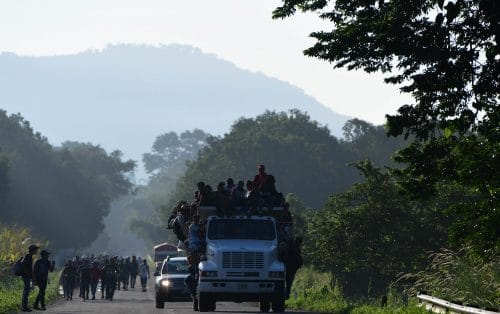How to Stop Mass Migration From Central America
COMMENTARY

It has been a difficult couple of years for Latin America. COVID-19 created a public health crisis and a severe economic downturn.
Women have been particularly hard hit. The rate of female participation in the labor market has fallen from 52% to 46% in the past two years.
The practical consequence of these crises has been for millions of people, especially from Central America, to embark on the perilous journey to the United States in search of a better life. But how, in a post-COVID context, can we build an economy in Central America where people do not feel compelled to migrate?
At its core, this involves both attracting more foreign investment to the region and better linking prospective migrants to employment in “internationally connected” sectors. This specifically requires work in five areas.
First, move “nearshoring” from abstract concept to concrete reality. The U.S. government has talked about supporting the shift of supply chains from China to Latin America. To date, however, specific financing, matchmaking with partners in the region, and other support has not been sufficiently forthcoming.
GK, the Honduras-based multinational I am proud to lead, already hosts key suppliers to world-leading manufacturing, services and technology companies at facilities in Central America and Mexico. A crucial ingredient for making nearshoring work is to get arriving companies up and running quickly. Making this happen is one of GK’s specialties. Yet, there is no platform or process for connecting companies departing China with those who can help them land in Latin America. Left to their own networks, companies often simply choose to stay in Asia.
Second, employers and educational institutions must collaborate on meeting workforce demand. At GK, we are often asked to hire and train most of the in-country workforce for new investors. We do this through just this type of partnership.
In selecting the workforce, we are able to prioritize hiring women and others from key communities. At present, approximately 40% of the 20,000 employees operating within GK’s infrastructure are women. Ensuring the inclusion of women throughout the region’s workforce is fundamental. A recent study by the World Bank estimated that gender exclusion in the workforce will cost Latin America 14% of GDP per capita over the next 30 years.
In addition, we prioritize employment opportunities for other marginalized communities. Those deported from the United States are often stigmatized and have a hard time reintegrating into Central American life. GK does U.S. background checks on most of our prospective employees, so we can employ deportees and others with confidence. Employment with GK gives them a reason to build their lives at home in Central America.
Third, drive trade facilitation. Puerto Cortés, Honduras, is a mere two-day sail to Miami, Florida, compared with an average of 25 days from Shanghai, China, to Los Angeles, California. Yet, to fully convert this proximity advantage into trade growth, components and finished goods need to get into and out of Central America more quickly. This means investing in improving the efficiency of ports, customs and — crucially — inland transportation.
The Dominican Rebublic-Central America Free Trade Agreement is a crucial economic anchor for the region. In the context of nearshoring, we should assess how it can be better utilized to catalyze inbound investment.
Fourth, Central America must build linkages to the global innovation ecosystem. Intellectual property and other “intangibles” now account for 90% of the value of the S&P 500. Long-term development requires an ability for Central Americans to create IP and technology-intensive enterprises. Making this a reality will require access to capital and a series of complementary policies.
GK is currently developing an “Altia Smart City,” where it will teach high school graduates English, give them tech training and link them to jobs in the global tech economy. Invariably, some of those trained will start innovative companies of their own, which will help to grow the pie for everyone.
Fifth, employers in Central America must commit to paying living wages, providing good working conditions and offering pathways for professional growth for their employees. GK has done this for 30 years in Central America as it has grown into a large, globally active company.
It is within our power to end the tragedy of mass migration from Central America. All we must do is to think and act differently.
Mr. Yusuf Amdani is Chairman of GK Group. He was born in Karachi, Pakistan, though he has been Honduran naturalized. His family had a long history of involvement in the textile and spinning industry, dating back to the 1940s, when they started manufacturing clothes and producing raw material for textiles. You can reach GK Group’s General Counsel Emilio Castro by email here.






















